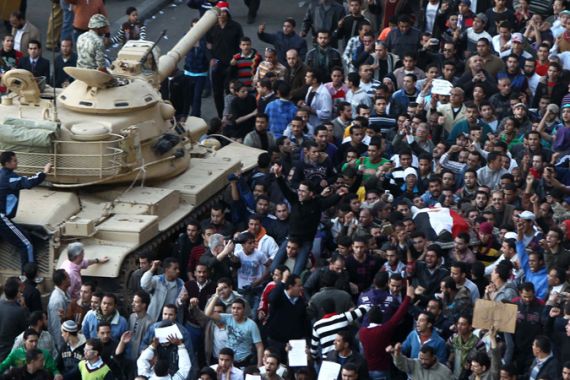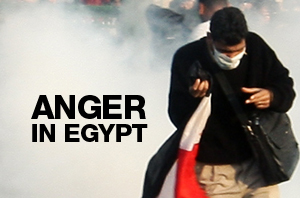Mubarak names his deputy and new PM
Protests continue as Egyptian president appoints former spy chief as his vice-president for the first time.

| Images of the thousands of Egyptian protesters that continue to defy a curfew in the capital Cairo and other cities |
Egyptian President Hosni Mubarak has appointed the country’s head of intelligence to the post of vice-president, in a move said to be a reaction to days of anti-government protests in cities across the country.
Omar Soleiman was sworn in on Saturday, the first time Mubarak appointed a vice-president during his 30-year rule. Ahmad Shafiq, a former chief of air staff, was appointed prime minister.
But Al Jazeera’s correspondents in Egypt have said that many of those taking to the streets demand a total change of guard, as opposed to a reshuffling of figures in the ruling National Democratic Party (NDP).
Tens of thousands of people in the capital Cairo gathered on Saturday, demanding an end to Hosni Mubarak’s presidency.
The demonstrations continued in defiance of an extended curfew, which state television reported will be in place from 4pm to 8am local time.
A military presence also remains, and the army warned the crowds in Tahrir Square in Cairo that if they defy the curfew, they would be in danger.
Al Jazeera’s Ayman Mohyeldin, reporting from Cairo, said that soldiers deployed to central Cairo are not intervening in the protests.
“Some of the soldiers here have said that the only way for peace to come to the streets of Cairo is for Mubarak to step down,” he said.
Similar crowds were gathering in the cities of Alexandria and Suez, Al Jazeera’s correspondents reported.
Cabinet resigns
The Egyptian cabinet meanwhile have formally resigned in response to the protests, and Ahmed Ezz, a businessman and senior figure in the ruling National Democratic Party (NDP) also resigned from his post as chairman of the Planning and Budget Committee.
Protesters ransacked and burned one of his company’s main offices in Mohandiseen, an area of Cairo.
State media reported on Saturday that some protesters held up posters with a cross marked over the face of Ezz, who is chairman of Ezz Steel.
Armoured personnel carriers remain stationed around the British and US embassies, as well as at the state television station.
Meanwhile, some mobile phone networks resumed service in the capital on Saturday, after being shut down by authorities on Friday. Internet services remain cut, and landline usage limited.
Authorities had blocked internet, mobile phone and SMS services in order to disrupt planned demonstrations.
The Reuters news agency reported that police had fired live ammunition at protesters, but there is no independent confirmation of that report.
In Suez, Al Jazeera’s Jamal ElShayyal reported that 1,000-2,000 protesters had gathered, and that the military was not confronting them.
ElShayyal quoted a military officer as saying that troops would “not fire a single bullet on Egyptians”.
The officer also said the only solution to the current unrest was “for Mubarak to leave”.
|
ElShayyal said that 1,700 public workers in Suez had gone on an indefinite strike seeking Mubarak’s resignation.
The several hundred protesters in Tahrir Square demonstrated in full view of the army, which had been deployed in the city to quell the popular unrest sweeping the Middle East’s most populous Muslim country since January 25.
They repeatedly shouted that their intentions were peaceful.
Mohamed ElBaradei, a leading opposition figure, told Al Jazeera that protests would continue until the president steps down.
He also stressed that the political “system” will have to change in Egypt before the country can move forward.
He termed president Mubarak’s midnight speech on Friday as “disappointing”, and called on him to resign.
The former head of the International Atomic Energy Agency (IAEA) also expressed “disappointment” with the US reaction to the protests, though he did stress that any change would have to come from “inside Egypt”.
He said that Mubarak should put in place an interim government that would arrange free and fair elections.
‘War zone’
Al Jazeera’s Jane Dutton, reporting from Cairo, said the normally bustling city looked more like a war zone early on Saturday morning.
Tanks have been patrolling the streets of the capital, and a statement from the Egyptian armed forces asked citizens to respect the curfew and to avoid congregating in large groups.
“There is broken glass everywhere … a lot of the burnt out shells of the police cars have been removed but you are aware that there were hours and hours of skirmishes on the streets of the capital city [last night],” Dutton said.
The number of people killed in protests over the past five days is reported to be in the scores, with at least 23 deaths confirmed in Alexandria, and at least 27 confirmed in Suez, with a further 22 deaths in Cairo.
